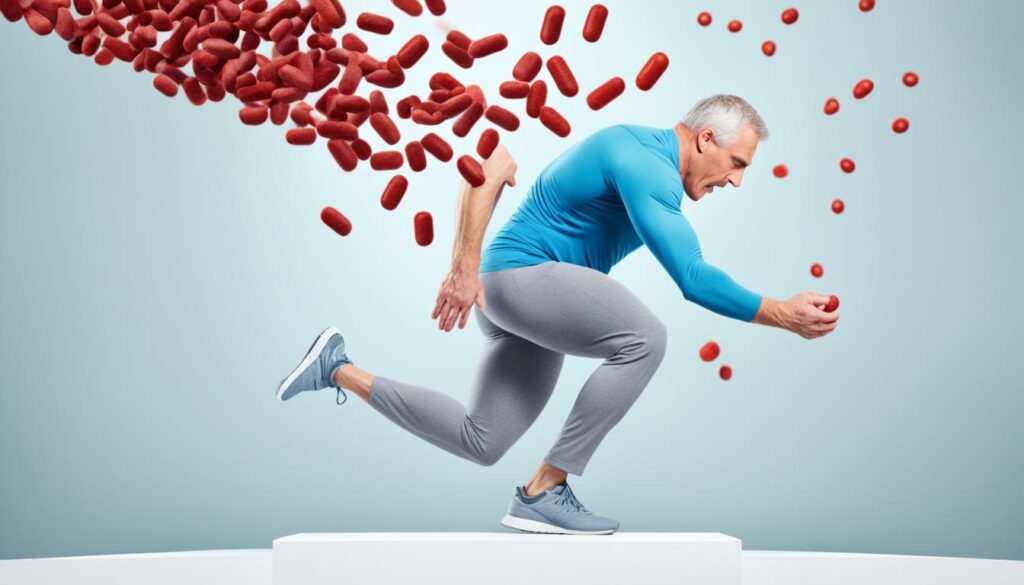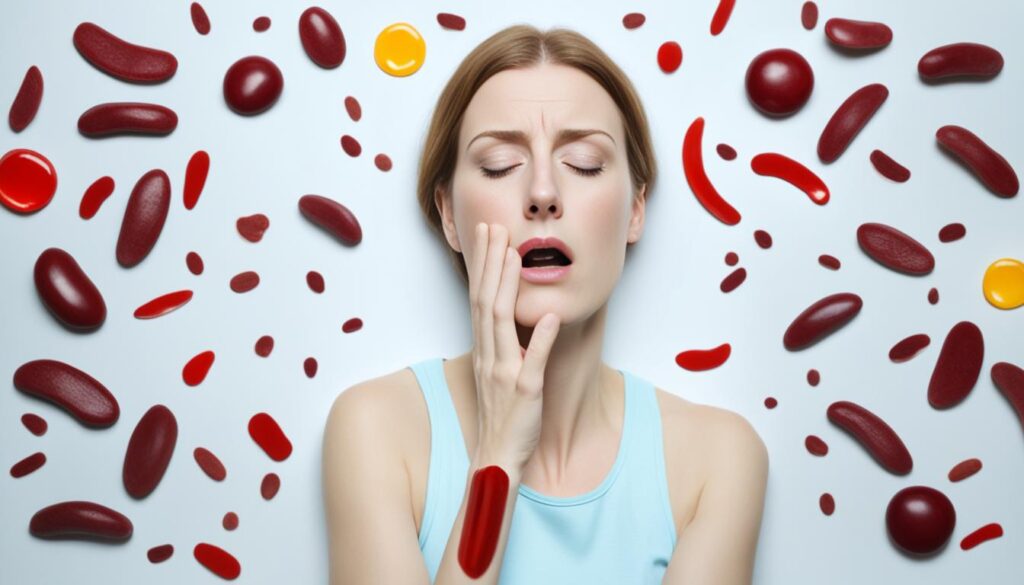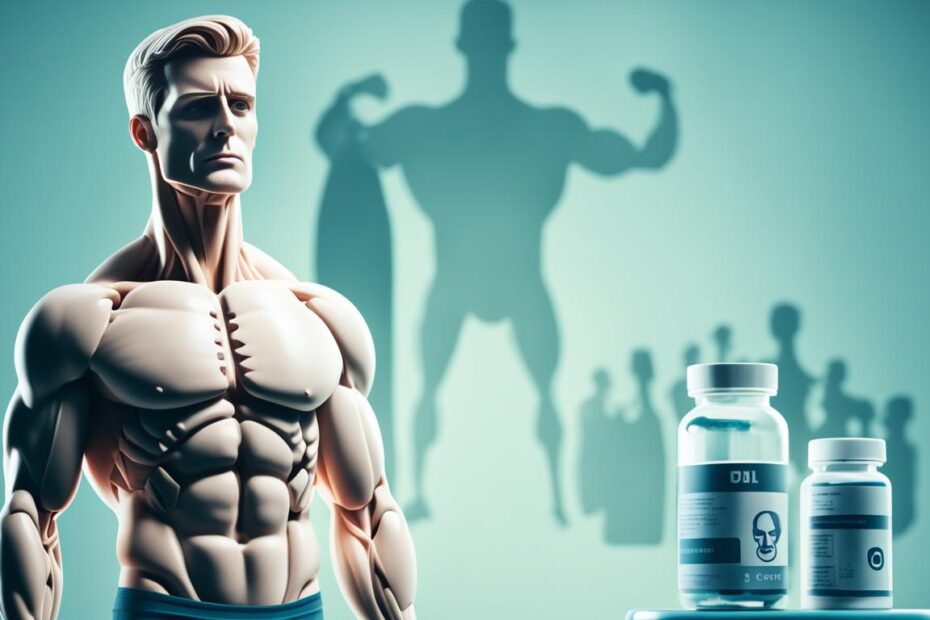I’ve often wondered about the link between losing weight and low iron levels. I have tried many diets, so I worry about health issues. It is not just about dropping weight.
Losing weight can make it hard for our bodies to take in nutrients, like iron. Iron is very important, and not having enough can make us feel tired and weak. Iron deficiency anemia can happen, especially when we are trying to lose weight.
Quick weight loss, eating too few calories, and unbalanced diets can lower our iron levels. It is important to lose weight in a healthy way. This will help avoid running low on important nutrients.
Oddly, being obese can also lead to not having enough iron. Losing some weight might even increase iron levels for some people. But how we lose the weight is very important.
The Relationship Between Weight Loss and Iron Levels
Weight loss and iron levels go hand in hand. People tend to forget about their nutrient intake when losing weight. They might face health problems, such as not having enough iron.
How Weight Loss Affects Nutrient Absorption
Losing weight quickly can mess up how our body takes in nutrients. If we drop our calories by a lot, we may not get the iron we need. This is real for folks on tough diets or after bariatric surgery.

The Role of Iron in the Body
Iron is super important for us. It helps make hemoglobin, which carries oxygen in our blood. Not having enough iron can make us feel tired and weak. Research shows that a lot of people trying to slim down don’t get enough iron. This is often the case for women and kids.
Common Causes of Iron Deficiency During Weight Loss
There are a few reasons why you might not get enough iron when losing weight:
- Not taking in enough iron due to eating fewer calories
- Your body’s iron handling changes with rapid weight loss
- You absorb less iron from food
- Taking up more iron during workouts
Finding a balance between losing weight and proper food is key. Knowing about these issues helps us keep our iron levels up when trying to reach our weight goals.
Understanding Iron Deficiency Anemia
Iron deficiency anemia happens when your body doesn’t have enough iron. Iron helps make hemoglobin, which carries oxygen in your blood. Without enough iron, your body feels tired and other symptoms show up.
It can affect anyone, but some groups are at higher risk. This includes women, infants, children, vegetarians, and those who donate blood often. If not caught early, the symptoms can get worse over time.

- Extreme fatigue and weakness
- Pale skin
- Shortness of breath
- Dizziness and headaches
- Cold hands and feet
- Unusual cravings for non-food items
Not treating iron deficiency anemia can cause serious health problems. It might lead to heart issues, trouble during pregnancy, or slow growth in kids. That’s why finding it early and treating it is crucial.
To stop it, I eat foods high in iron, like red meat and green veggies. I also eat foods with vitamin C, which help my body absorb more iron. For more info, check out the guide from Mayo Clinic.
Can Weight Loss Cause Iron Deficiency?
Weight loss can change our body in many ways, including our iron levels. Let’s look into how losing weight might make us low on iron.
Rapid Weight Loss and Iron Stores
Losing weight quickly can use up our iron stores. If we shed pounds fast, our body might not get used to needing less nutrients. This can drop our iron levels if we don’t eat foods rich in iron.
Calorie Restriction and Iron Intake
Reducing calories can lower our iron amount without us knowing it. When we eat less, we might not get enough iron. This happens if we stop eating iron-packed foods, like red meat or leafy greens.
Unbalanced Diets and Nutrient Deficiencies
A diet out of balance can lack important nutrients, iron included. Very little food or cutting out certain foods doesn’t give our body all it needs. This can cause various health troubles, iron deficiency being one.
Keeping an eye on our iron levels during weight loss is key for good health. Research has shown that losing weight can mess with iron levels in overweight people. Balancing weight loss with eating right helps steer clear of iron issues.
Signs and Symptoms of Iron Deficiency During Weight Loss
Watching for iron deficiency symptoms is key during weight loss. These signs often look like regular effects of losing weight. Let’s look at the common signals:
- Fatigue: I feel tired, even after sleeping enough.
- Pale skin: My face seems dull or a bit yellow.
- Brittle nails: My nails are weak and look like spoons.
- Shortness of breath: I get tired easily from doing simple tasks.
- Headaches: I often have headaches without a clear reason.
- Cold hands and feet: My arms and legs are cold, even when it’s warm outside.
I’ve also seen some other not-so-normal signs. My heart might start racing for no obvious cause, or I start wanting to eat things that aren’t food, like ice or dirt. Sometimes, my tongue feels painful, and I feel dizzy a lot. These signs are easy to ignore, but I shouldn’t.
It’s really important to watch these iron deficiency signs during weight loss. If I notice any of these signs, I talk to my doctor. They can check my iron levels and give advice on my diet. They might also suggest taking supplements if it’s necessary.
Preventing Iron Deficiency While Losing Weight
On a journey to lose weight, eating right is super important. Not getting enough iron is a real issue, especially for those dieting hard. I make sure to eat foods high in iron.
Learning about iron and anemia made me focus more on staying healthy instead of choosing quick fixes.
Incorporating iron-rich foods into your diet
I eat lots of foods rich in iron. Things like lean meat, poultry, and seafood are great sources. Plus, beans, lentils, and green veggies are good for iron, too. Eating breakfast cereals fortified with iron helps as well.
The importance of vitamin C for iron absorption
I know vitamin C helps my body use iron better. So, I eat iron foods with something full of vitamin C. Adding citrus fruits, bell peppers, or tomatoes to meals is an easy way.
For example, I love lemon on spinach salad or an orange with my cereal.
Considering iron supplementation
Sometimes, I might need iron supplements. But I only take them if a doctor says it’s okay. Eating well and checking my iron levels often are still the best ways to stay healthy.
I make smart choices to avoid low iron while working on my weight.
